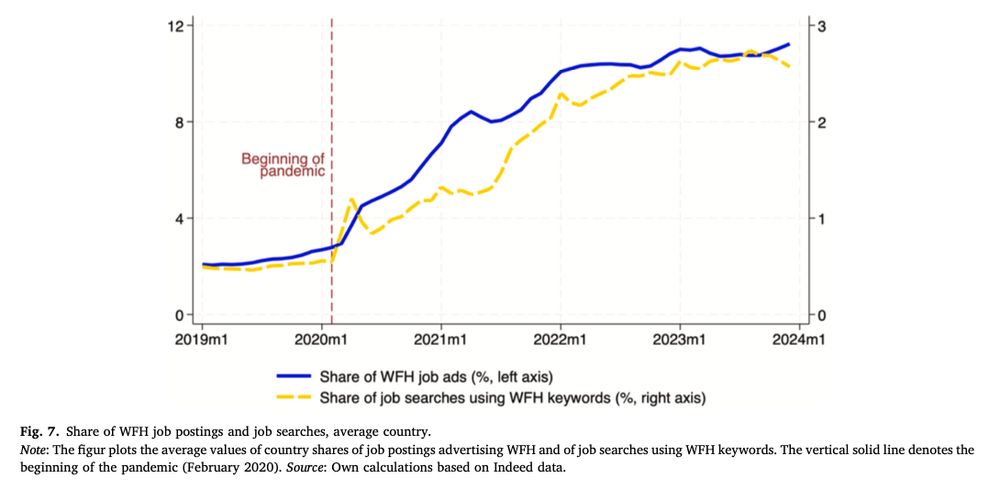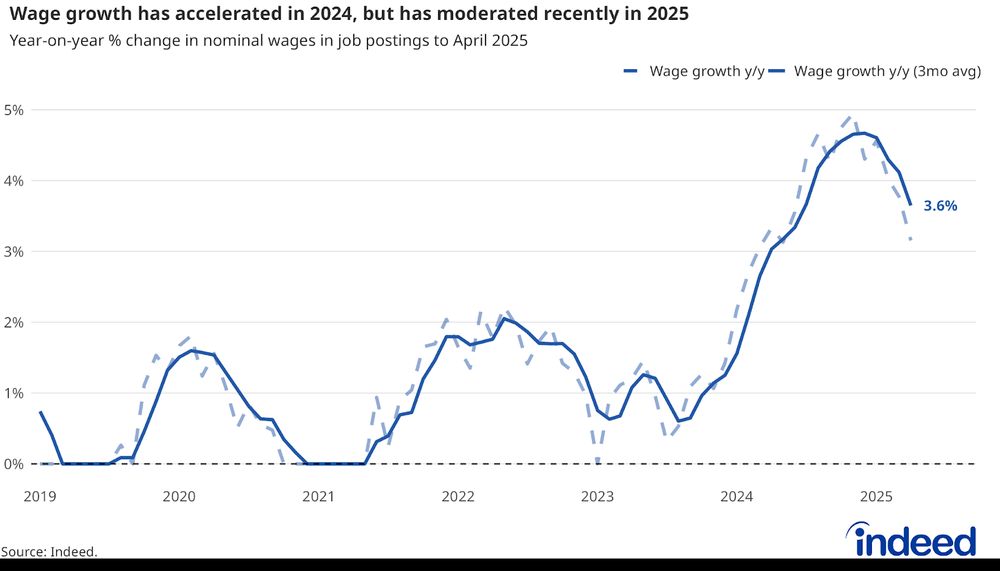
Pawel Adrjan
@paweladrjan.bsky.social
Economist at Indeed
Research fellow at Regent's Park College, Oxford
📈 Using data to make the world of work better for all 🌈
https://sites.google.com/site/paweladrjaneconomics/
Sevilla, España
Research fellow at Regent's Park College, Oxford
📈 Using data to make the world of work better for all 🌈
https://sites.google.com/site/paweladrjaneconomics/
Sevilla, España
We find no effect on job postings or public safety. In other words, people weren’t leaving because of fewer jobs or rising crime. They were leaving because of hostile political declarations

November 1, 2025 at 7:37 PM
We find no effect on job postings or public safety. In other words, people weren’t leaving because of fewer jobs or rising crime. They were leaving because of hostile political declarations
Census data shows a 1% drop in the young adult population in affected areas (with a statistically significant effect for women,) meaning that "symbolic" political rhetoric had real demographic consequences

November 1, 2025 at 7:37 PM
Census data shows a 1% drop in the young adult population in affected areas (with a statistically significant effect for women,) meaning that "symbolic" political rhetoric had real demographic consequences
This probably wasn’t just LGBTQ+ individuals. Others also likely responded to the social signal.
Migration intentions rose most where prior support for far-right parties was lower, suggesting a surprise factor of political actions clashing with local social norms
Migration intentions rose most where prior support for far-right parties was lower, suggesting a surprise factor of political actions clashing with local social norms

November 1, 2025 at 7:37 PM
This probably wasn’t just LGBTQ+ individuals. Others also likely responded to the social signal.
Migration intentions rose most where prior support for far-right parties was lower, suggesting a surprise factor of political actions clashing with local social norms
Migration intentions rose most where prior support for far-right parties was lower, suggesting a surprise factor of political actions clashing with local social norms
Jobseekers didn’t just look anywhere. They searched in more inclusive areas, both within Poland and abroad (esp. EU countries with same-sex marriage).
In other words, people actively sought places where social norms aligned with their own
In other words, people actively sought places where social norms aligned with their own

November 1, 2025 at 7:36 PM
Jobseekers didn’t just look anywhere. They searched in more inclusive areas, both within Poland and abroad (esp. EU countries with same-sex marriage).
In other words, people actively sought places where social norms aligned with their own
In other words, people actively sought places where social norms aligned with their own
Using data on 67 million job-search clicks on Indeed, we found:
📈 a 12% rise in domestic out-of-county search
🌐a 15% rise in international search
immediately after these resolutions were adopted
📈 a 12% rise in domestic out-of-county search
🌐a 15% rise in international search
immediately after these resolutions were adopted

November 1, 2025 at 7:36 PM
Using data on 67 million job-search clicks on Indeed, we found:
📈 a 12% rise in domestic out-of-county search
🌐a 15% rise in international search
immediately after these resolutions were adopted
📈 a 12% rise in domestic out-of-county search
🌐a 15% rise in international search
immediately after these resolutions were adopted
Between 2019 and 2021, nearly 100 Polish localities declared themselves “free from LGBT ideology.”
These declarations carried no legal force, but they sent a clear social/political signal and were widely publicized
These declarations carried no legal force, but they sent a clear social/political signal and were widely publicized

November 1, 2025 at 7:36 PM
Between 2019 and 2021, nearly 100 Polish localities declared themselves “free from LGBT ideology.”
These declarations carried no legal force, but they sent a clear social/political signal and were widely publicized
These declarations carried no legal force, but they sent a clear social/political signal and were widely publicized
🚨 New paper alert: Exclusionary political rhetoric alone can drive people to leave their hometowns
In Poland, anti-LGBTQ resolutions by 100 local governments caused a rise in migration intentions, reflected in job search
Here’s what @jangromadzki.bsky.social and I found: 🧵
In Poland, anti-LGBTQ resolutions by 100 local governments caused a rise in migration intentions, reflected in job search
Here’s what @jangromadzki.bsky.social and I found: 🧵

November 1, 2025 at 7:35 PM
🚨 New paper alert: Exclusionary political rhetoric alone can drive people to leave their hometowns
In Poland, anti-LGBTQ resolutions by 100 local governments caused a rise in migration intentions, reflected in job search
Here’s what @jangromadzki.bsky.social and I found: 🧵
In Poland, anti-LGBTQ resolutions by 100 local governments caused a rise in migration intentions, reflected in job search
Here’s what @jangromadzki.bsky.social and I found: 🧵
Con ganas de volver a México para compartir nuestra investigación sobre el mercado laboral y hablar de las tendencias que vemos en los datos de Indeed. ¿Alguien de mi red estará en CDMX la semana que viene?

October 27, 2025 at 8:46 PM
Con ganas de volver a México para compartir nuestra investigación sobre el mercado laboral y hablar de las tendencias que vemos en los datos de Indeed. ¿Alguien de mi red estará en CDMX la semana que viene?
The overall share of UK postings mentioning remote and/or hybrid work has remained fairly stable at around 15% for several months, near all-time highs.
A screenshot from our Data Portal:
A screenshot from our Data Portal:

September 25, 2025 at 6:14 PM
The overall share of UK postings mentioning remote and/or hybrid work has remained fairly stable at around 15% for several months, near all-time highs.
A screenshot from our Data Portal:
A screenshot from our Data Portal:
2-3 days a week in the office has become the norm in hybrid job postings. Attendance requirements have tightened over the last few years, but there's no evidence of any significant shift beyond 3 days in the office.
UK data:
UK data:

September 25, 2025 at 6:13 PM
2-3 days a week in the office has become the norm in hybrid job postings. Attendance requirements have tightened over the last few years, but there's no evidence of any significant shift beyond 3 days in the office.
UK data:
UK data:
Reported labour shortages tell a similar story. Industrial firms in Spain and Italy now report more shortages than Germany and France. But the North–South gap has narrowed sharply since mid-2022

September 8, 2025 at 6:47 AM
Reported labour shortages tell a similar story. Industrial firms in Spain and Italy now report more shortages than Germany and France. But the North–South gap has narrowed sharply since mid-2022
Hiring trends reflect economic momentum. Job posting growth closely tracks GDP growth: Spain’s GDP is up 8.8% and Italy’s 6.3% since Q4 2019, while Germany is nearly flat (0.3%) and France around 5%

September 8, 2025 at 6:46 AM
Hiring trends reflect economic momentum. Job posting growth closely tracks GDP growth: Spain’s GDP is up 8.8% and Italy’s 6.3% since Q4 2019, while Germany is nearly flat (0.3%) and France around 5%
Labour markets remain tighter in Germany and France than in Italy and Spain. However, the gap is shrinking as job vacancies fall in the North and rise in the South

September 8, 2025 at 6:46 AM
Labour markets remain tighter in Germany and France than in Italy and Spain. However, the gap is shrinking as job vacancies fall in the North and rise in the South
Europe's labour markets are converging, as hiring demand is strong in the South while falling in the North.
As of late August, job postings in Spain are 46% and Italy 53% above pre-pandemic levels.
Guillermo Gallacher and I wrote a blog post about Eurozone's four largest economies 👇
As of late August, job postings in Spain are 46% and Italy 53% above pre-pandemic levels.
Guillermo Gallacher and I wrote a blog post about Eurozone's four largest economies 👇

September 8, 2025 at 6:46 AM
Europe's labour markets are converging, as hiring demand is strong in the South while falling in the North.
As of late August, job postings in Spain are 46% and Italy 53% above pre-pandemic levels.
Guillermo Gallacher and I wrote a blog post about Eurozone's four largest economies 👇
As of late August, job postings in Spain are 46% and Italy 53% above pre-pandemic levels.
Guillermo Gallacher and I wrote a blog post about Eurozone's four largest economies 👇
Full paper (open access):
doi.org/10.1016/j.la...
doi.org/10.1016/j.la...
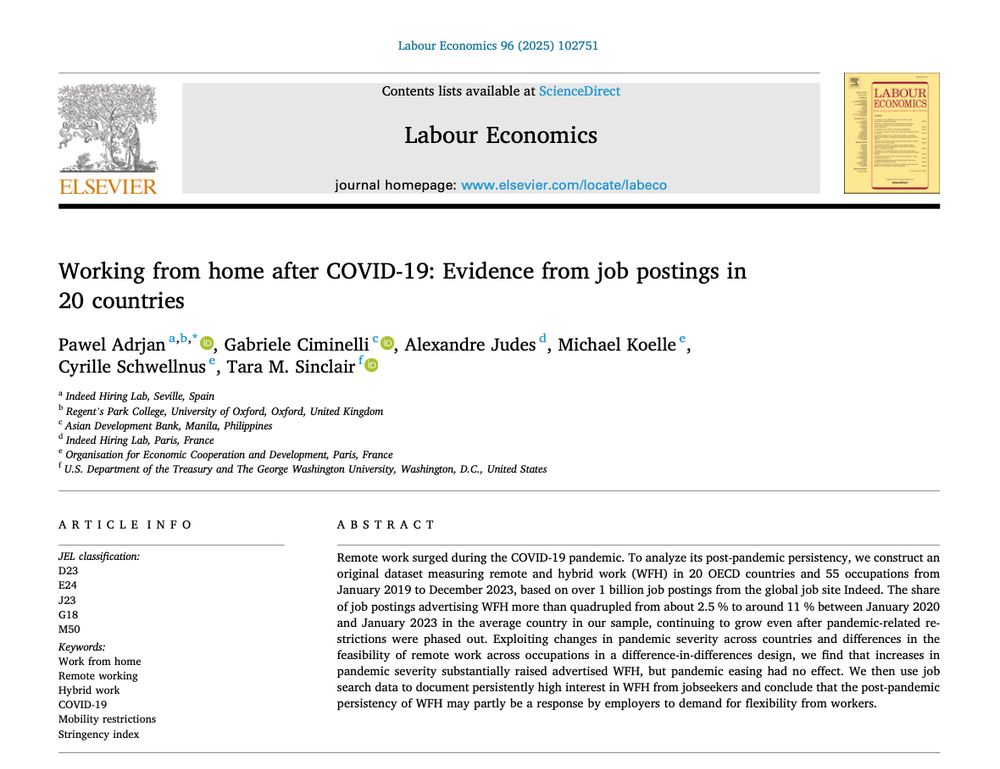
July 10, 2025 at 7:16 AM
Full paper (open access):
doi.org/10.1016/j.la...
doi.org/10.1016/j.la...
Even as restrictions eased, advertised WFH (a forward-looking signal) kept rising - unlike realised WFH, which fell post-COVID and stabilised.
This suggests firms have locked in new norms for remote working
This suggests firms have locked in new norms for remote working
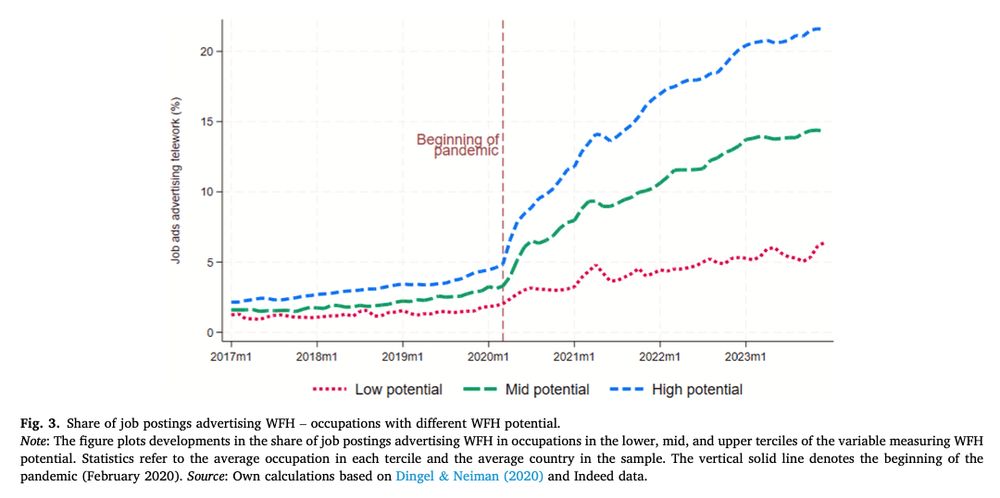
July 10, 2025 at 7:15 AM
Even as restrictions eased, advertised WFH (a forward-looking signal) kept rising - unlike realised WFH, which fell post-COVID and stabilised.
This suggests firms have locked in new norms for remote working
This suggests firms have locked in new norms for remote working
Is working from home just a pandemic blip? Not according to the data.
We analysed 1 billion job postings in 20 OECD countries.
The share of jobs advertising remote/hybrid work quadrupled from 2.5% to 11% (2019–2023) and has been stable since
🧵
We analysed 1 billion job postings in 20 OECD countries.
The share of jobs advertising remote/hybrid work quadrupled from 2.5% to 11% (2019–2023) and has been stable since
🧵
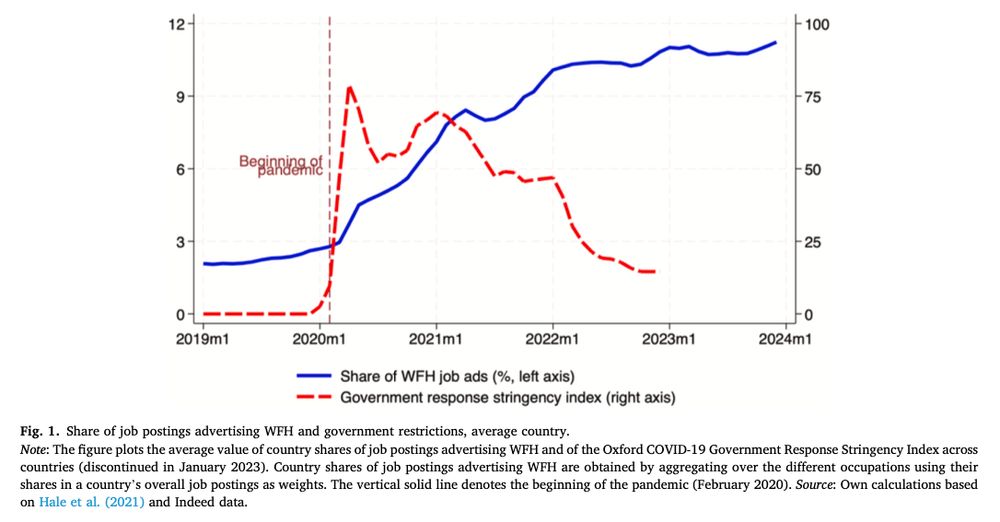
July 10, 2025 at 7:14 AM
Is working from home just a pandemic blip? Not according to the data.
We analysed 1 billion job postings in 20 OECD countries.
The share of jobs advertising remote/hybrid work quadrupled from 2.5% to 11% (2019–2023) and has been stable since
🧵
We analysed 1 billion job postings in 20 OECD countries.
The share of jobs advertising remote/hybrid work quadrupled from 2.5% to 11% (2019–2023) and has been stable since
🧵
📉 New job posting data shows a growing North-South divide in Europe’s labour market as of mid-April:
🇪🇸 Spain up 4% in the past month, now 65% above pre-pandemic levels
🇮🇹 Italy high & holding steady
🇩🇪 Germany & 🇬🇧 UK sliding
No crash anywhere (yet) but a continued divergence
🇪🇸 Spain up 4% in the past month, now 65% above pre-pandemic levels
🇮🇹 Italy high & holding steady
🇩🇪 Germany & 🇬🇧 UK sliding
No crash anywhere (yet) but a continued divergence
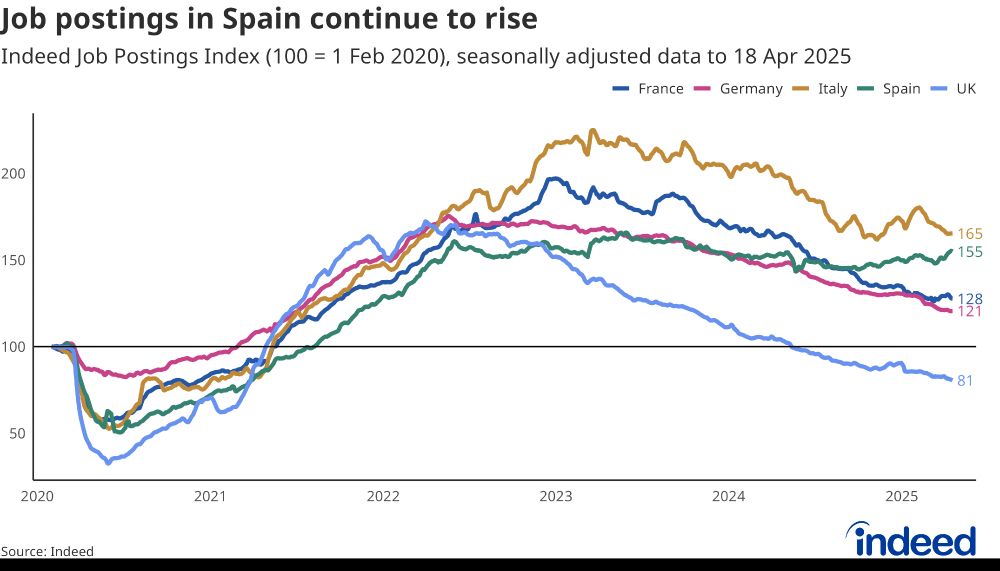
April 24, 2025 at 8:56 AM
📉 New job posting data shows a growing North-South divide in Europe’s labour market as of mid-April:
🇪🇸 Spain up 4% in the past month, now 65% above pre-pandemic levels
🇮🇹 Italy high & holding steady
🇩🇪 Germany & 🇬🇧 UK sliding
No crash anywhere (yet) but a continued divergence
🇪🇸 Spain up 4% in the past month, now 65% above pre-pandemic levels
🇮🇹 Italy high & holding steady
🇩🇪 Germany & 🇬🇧 UK sliding
No crash anywhere (yet) but a continued divergence
Using real-time advertised wages & collective bargaining agreements, we forecast official wage growth series.
Our central projection shows euro area Compensation per Employee growth slowing from 4.4% in Q3 to 4.1% in Q4 2024, aligning with the @ecb.europa.eu forecast of 4.2%
3/
Our central projection shows euro area Compensation per Employee growth slowing from 4.4% in Q3 to 4.1% in Q4 2024, aligning with the @ecb.europa.eu forecast of 4.2%
3/
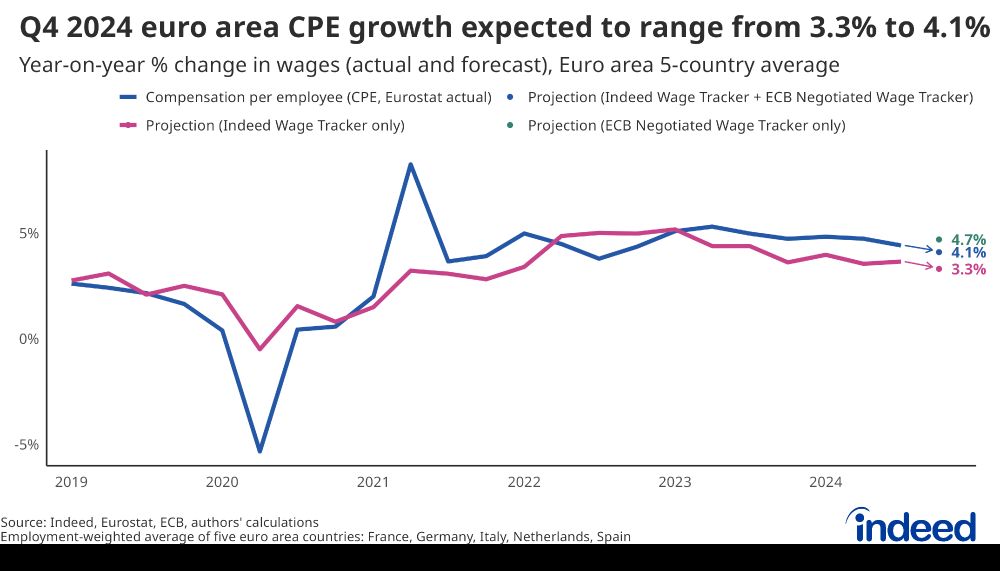
January 28, 2025 at 8:57 AM
Using real-time advertised wages & collective bargaining agreements, we forecast official wage growth series.
Our central projection shows euro area Compensation per Employee growth slowing from 4.4% in Q3 to 4.1% in Q4 2024, aligning with the @ecb.europa.eu forecast of 4.2%
3/
Our central projection shows euro area Compensation per Employee growth slowing from 4.4% in Q3 to 4.1% in Q4 2024, aligning with the @ecb.europa.eu forecast of 4.2%
3/
🇪🇺 Posted #wages in the #euro area grew 3.3% in 2024, but the pace varied by country, reflecting different rates of real wage catch-up after the recent period of high #inflation:
🇫🇷 1.8%
🇩🇪 2.8%
🇮🇹 2.9%
🇮🇪 4.3%
🇪🇸 5.0%
🇳🇱 6.1%
2/
🇫🇷 1.8%
🇩🇪 2.8%
🇮🇹 2.9%
🇮🇪 4.3%
🇪🇸 5.0%
🇳🇱 6.1%
2/
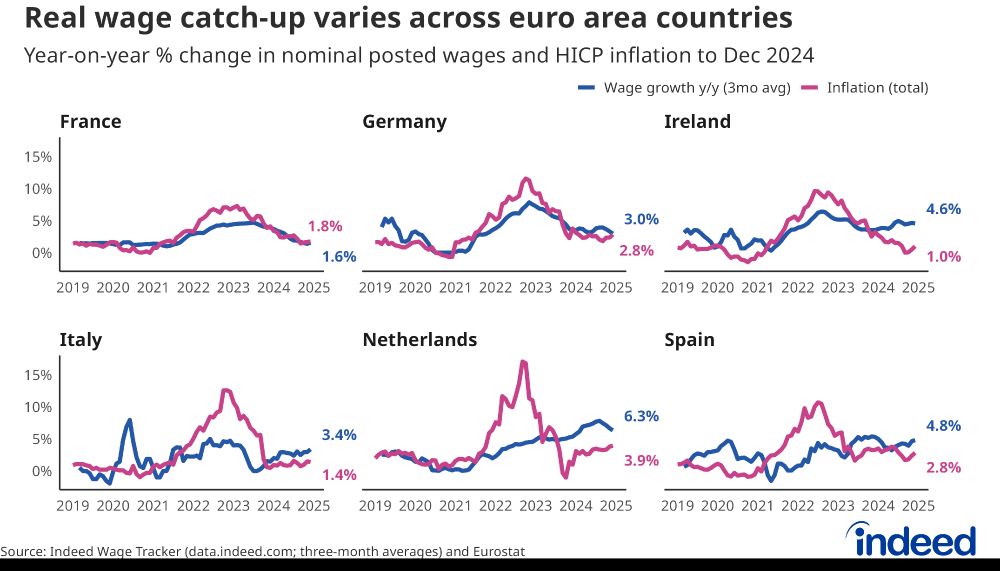
January 28, 2025 at 8:56 AM
🇪🇺 Posted #wages in the #euro area grew 3.3% in 2024, but the pace varied by country, reflecting different rates of real wage catch-up after the recent period of high #inflation:
🇫🇷 1.8%
🇩🇪 2.8%
🇮🇹 2.9%
🇮🇪 4.3%
🇪🇸 5.0%
🇳🇱 6.1%
2/
🇫🇷 1.8%
🇩🇪 2.8%
🇮🇹 2.9%
🇮🇪 4.3%
🇪🇸 5.0%
🇳🇱 6.1%
2/
📢 New data from the #Indeed Hiring Lab! 📈 Ahead of this week’s ECB Governing Council meetings, we’ve released December data from our Wage Tracker.
In a new blog post, @rlydon.bsky.social, Vahagn Galstyan and I dive into euro area wage trends and their implications for monetary policy. 🇪🇺🧵 1/
In a new blog post, @rlydon.bsky.social, Vahagn Galstyan and I dive into euro area wage trends and their implications for monetary policy. 🇪🇺🧵 1/
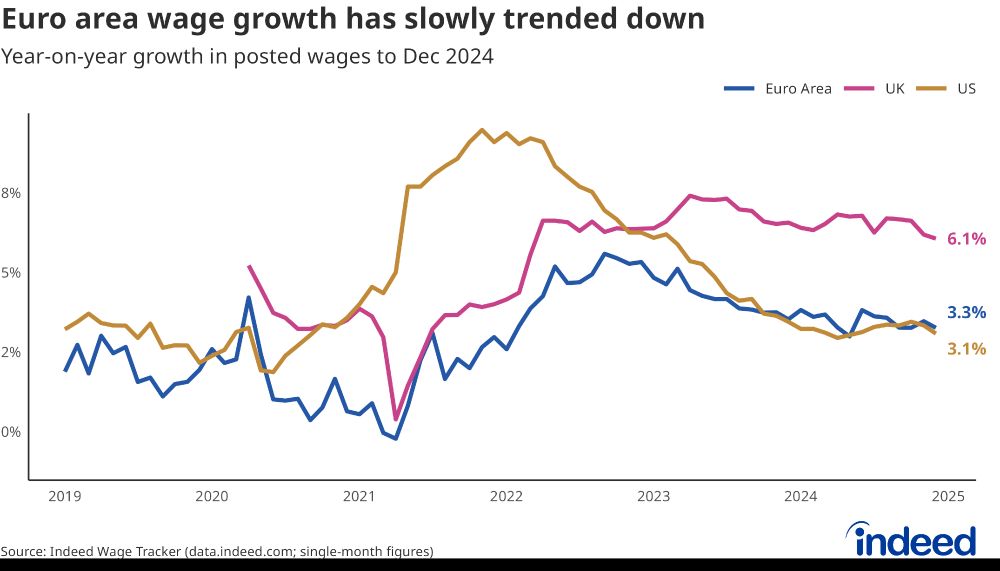
January 28, 2025 at 8:55 AM
📢 New data from the #Indeed Hiring Lab! 📈 Ahead of this week’s ECB Governing Council meetings, we’ve released December data from our Wage Tracker.
In a new blog post, @rlydon.bsky.social, Vahagn Galstyan and I dive into euro area wage trends and their implications for monetary policy. 🇪🇺🧵 1/
In a new blog post, @rlydon.bsky.social, Vahagn Galstyan and I dive into euro area wage trends and their implications for monetary policy. 🇪🇺🧵 1/
This work led to the Indeed Wage Tracker, a forward-looking indicator of wage momentum across countries.
data.indeed.com#/wages
data.indeed.com#/wages
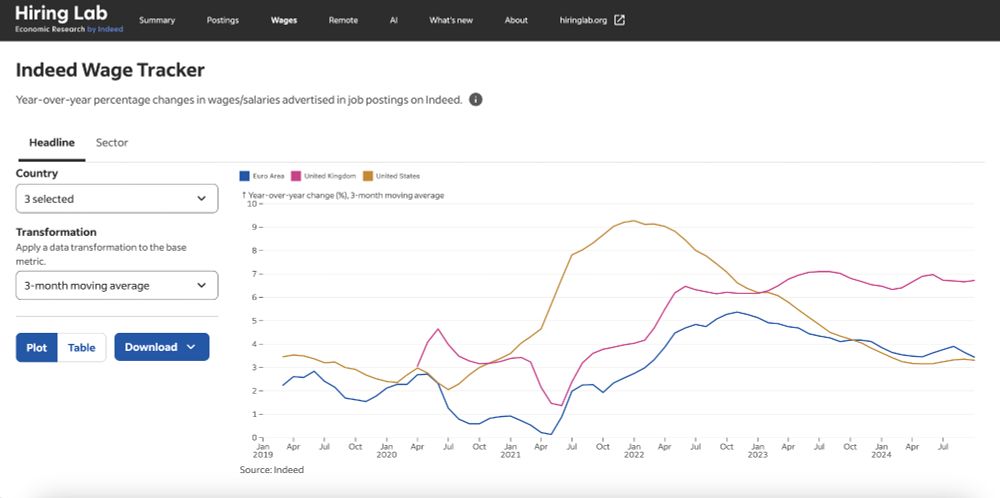
December 17, 2024 at 12:01 PM
This work led to the Indeed Wage Tracker, a forward-looking indicator of wage momentum across countries.
data.indeed.com#/wages
data.indeed.com#/wages
Excited to share that my paper with Reamonn Lydon is now published in Research in Labor Economics!
Main insights:
✅ Online job postings offer timely insights into wage trends
✅ Post-pandemic wage growth surged, especially for lower-paid jobs — signalling strong labour demand
Main insights:
✅ Online job postings offer timely insights into wage trends
✅ Post-pandemic wage growth surged, especially for lower-paid jobs — signalling strong labour demand
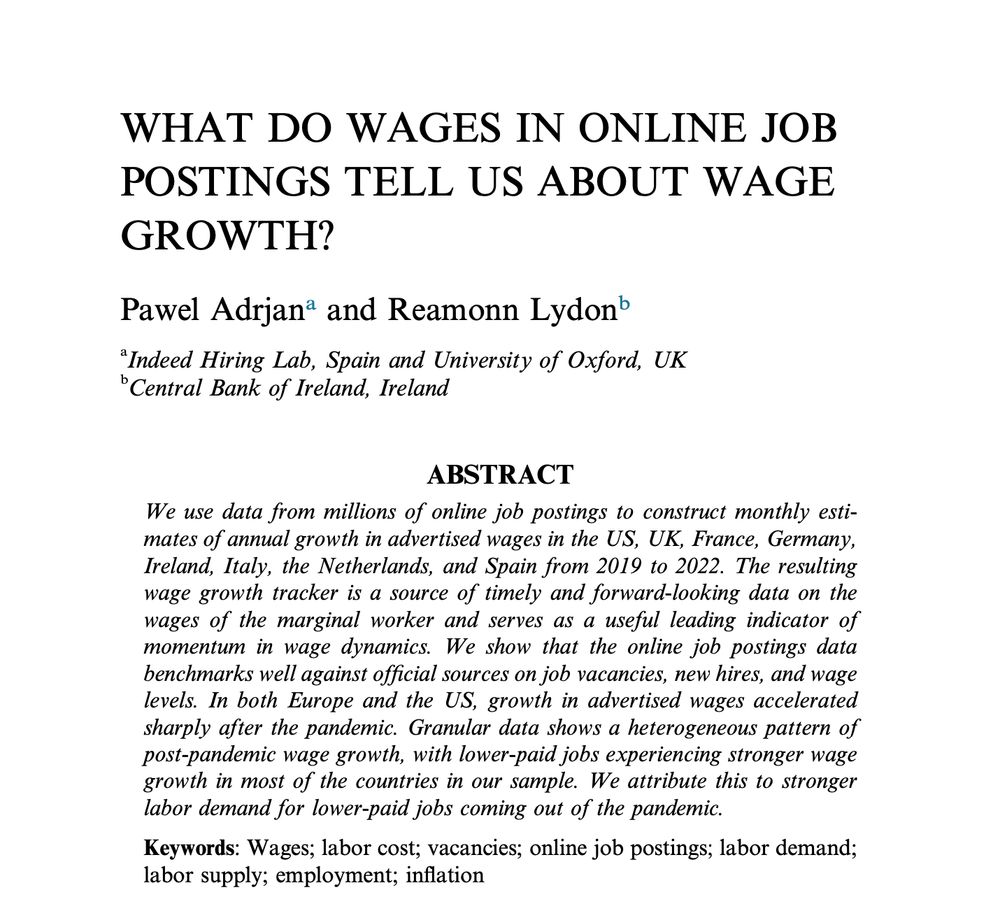
December 17, 2024 at 12:00 PM
Excited to share that my paper with Reamonn Lydon is now published in Research in Labor Economics!
Main insights:
✅ Online job postings offer timely insights into wage trends
✅ Post-pandemic wage growth surged, especially for lower-paid jobs — signalling strong labour demand
Main insights:
✅ Online job postings offer timely insights into wage trends
✅ Post-pandemic wage growth surged, especially for lower-paid jobs — signalling strong labour demand


